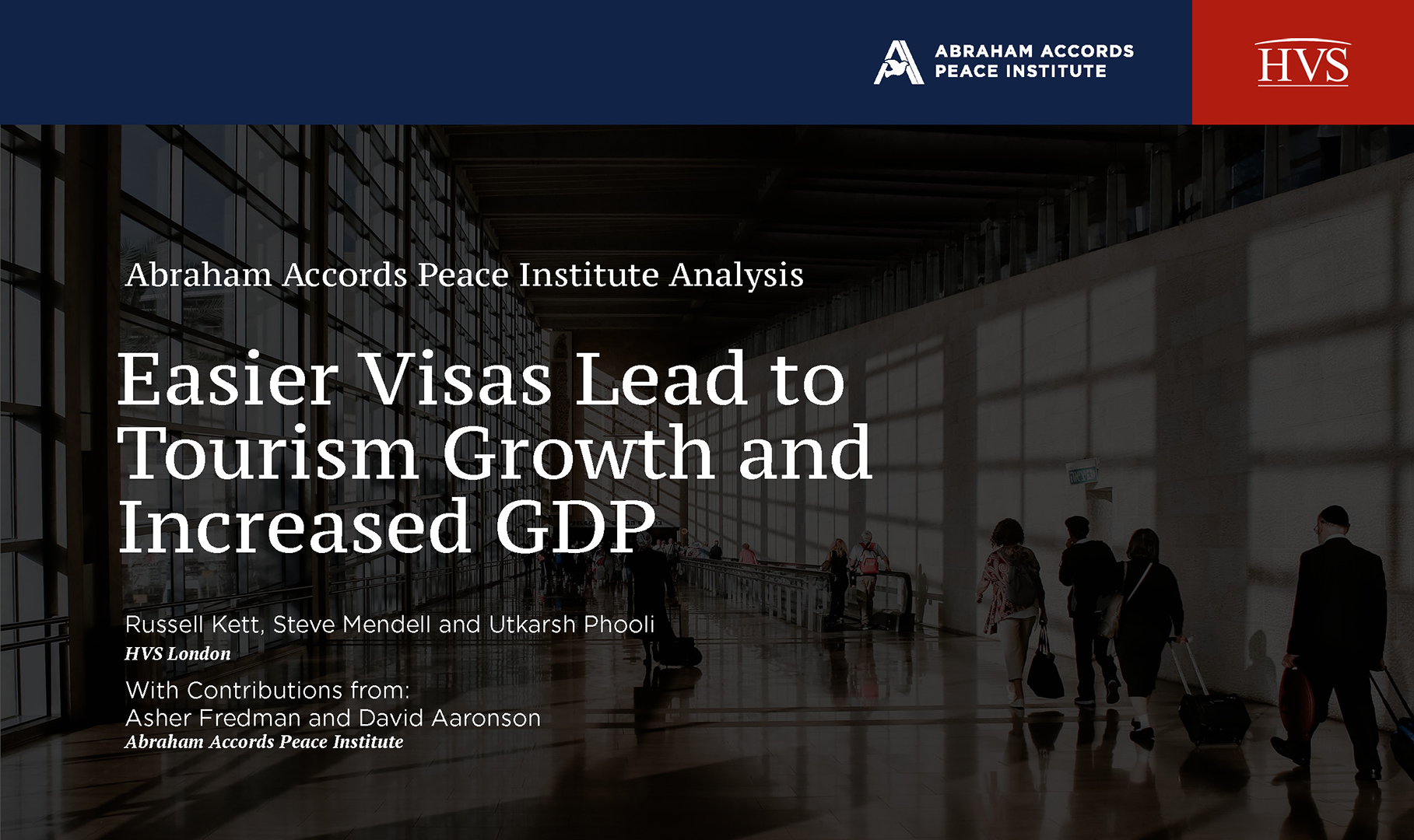Analysis
AAPI-HVS London Publish Joint Abraham Accords Report: “Easier Visas Lead to Tourism Growth and Increased GDP”
June 01, 2023

Executive Summary:
The Abraham Accords (AA) opened the door to warm peace and full relations between Israel and several of its Arab neighbours. An analysis conducted by HVS, in partnership with the Abraham Accords Peace Institute (AAPI), indicates that improved visa procedures would expand the movement of tourists among AA member nations, resulting in economic growth and stronger people-to-people ties. The reduction in barriers to increased tourism is an integral component in enabling regional trade and economic partnerships, as discussed in AAPI’s paper on a regional Free Trade Area.
While hundreds of thousands of Israelis have visited Accords member countries, relatively few citizens of these countries have visited Israel since the signing of the historic peace agreements. There are several factors contributing to the relatively small number of such visits. This paper examines one of these factors - the visa process and requirements for travellers from Abraham Accords and other Middle Eastern countries wishing to visit Israel. It provides recommendations, including the implementation of an eVisa policy, which can lead to an increase in Abraham Accords visitors to Israel, thereby helping to realize the great potential of the tourism sector for contributing to mutually-beneficial cooperation and peace.
In general, countries which have a more traveller friendly policy regarding entry visas benefit from expanded tourist growth, which has a positive effect on their GDP.
Visa restrictions are a policy instrument that governments use to monitor, control and limit the cross-border flow of people. These restrictions impose a burden on those subjected to them and allow the country imposing the restriction to pre-screen individuals before they arrive at its border. Visa restrictions are considered the ‘first line of defence’ against the entry of ‘risky’ travellers, who are seen as potentially posing a threat to the security, stability or resources of a country.
The introduction of a visa restriction by a destination country for citizens from a particular origin country can deter tourism inflows. Studies undertaken by Neumayer (2006, 2010 and 2011) and Bertoli & Fernández‐Huertas (2012) show the effect of visa restrictions on a country’s tourism levels. Neumayer (2010) observed that countries with visa restrictions reduce on average the bilateral flow of tourists by around 60%. Further studies on this topic show that countries with visa restrictions reduce on average the bilateral flow of exports and foreign direct investment by about 25%, and the bilateral flow of immigrants by around 40% (Bertoli & Fernández‐Huertas, 2012).
Visa restrictions, therefore, serve as a mechanism employed by many countries to regulate the entry of foreign travellers. These restrictions, while intended to maintain security and control over immigration, can have a profound impact on the tourism industry. The process of obtaining a visa often entails significant costs, bureaucratic procedures, and delays, thereby presenting a substantial hurdle for potential tourists.
The main challenge for now remains finding the proper balance between easing visa restrictions and national security considerations. Currently, the visa status for travel between Israel and other Abraham Accords countries remains diverse, with UAE – Israel establishing a reciprocated visa exemption agreement, Bahrain – Israel having visa exemption limited to non-ordinary passports, and Morocco – Israel having a non-reciprocated eVisa facility for Israelis traveling to Morocco. Israel remains without an eVisa scheme for Abraham Accords countries or other nations. Further details on the visa relationships between each nation are provided in the full report.
Looking at case studies of recent visa waiver agreements between Israel and Georgia (2014), Taiwan (2011), Ukraine (2011), Belarus (2015) and Serbia (2010), there exists evidence of immediate growth of tourism arrivals spread across multiple years. While these growth periods have not been sustained over the long term in most cases, other factors like expenditure on market development and a lack of dedicated growth plans could have played a role in the stagnation of arrivals from these markets. Despite this stagnation, visa waiver agreements saw compound annual growth rates between 4.5% and 20.0% for different markets over a two to eight year period. These case studies provide instances supporting the expansion of visa waiver agreements in Israel.
While these cases pertain to Israel, the biggest study of the impact of visa waivers on regional cooperation remains the formation of the Schengen zone, which improved trade, economic ties and tourism between participating countries as well as internationally. Multiple studies have taken the Schengen case study in the view of replication across stable regions around the globe.
Although the benefits of a relaxed visa policy are evident, studies have also highlighted possible negative effects on national security, population sentiments and stability (Artal-Tur, Pallardo-Lopez & Requena-Silvente, 2013; Beenstock, Felsenstein & Rubin, 2015). While the UAE – Israel normalization has led to Israel becoming a top 20 source market for Dubai in 2022, and its 8th largest source market for the first quarter of 2023 (Department of Economy and Tourism, 2023), opposition to Israel and normalization remains among parts of the populations of Abraham Accords countries. Such opposition creates national security considerations for Israel in determining its visa policy. A full review of the range of policies indicates that the most practical lever to improve tourism could be the adoption of an eVisa policy between all member nations. This decision can potentially account for national security considerations while improving tourism, without not adding pressure to the existing consular services infrastructure.
While eVisa policies, as noted, already exist in some bilateral relations (Bahrain and Morocco extending the opportunity to apply for eVisas to Israeli citizens), significant growth could be activated by an Israeli decision to reciprocate the facility to Bahrain and Morocco immediately, while planning to extend it to other nations in the region and around the globe. A robust eVisa program can improve Israel’s attractiveness to potential international travelers, as well as the country’s global destination ranking.